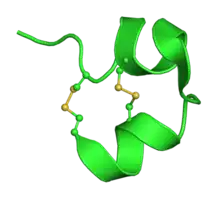| Hefutoxin family | |||||||||
|---|---|---|---|---|---|---|---|---|---|
 | |||||||||
| Identifiers | |||||||||
| Symbol | Toxin_25 | ||||||||
| Pfam | PF08095 | ||||||||
| InterPro | IPR012630 | ||||||||
| |||||||||
Kappa- Hefutoxin 1 and 2 are toxins from the venom of the Asian forest black scorpion Heterometrus fulvipes with a unique structure. It blocks the potassium channels Kv1.2 and Kv1.3 and slows the activation of Kv1.3.
Source
The kappa- Hefutoxin 1 and 2 (κ- hefutoxin1/2) are toxic components in the venom of Heterometrus fulvipes that belongs to the family scorpionidae. It is also known as the Asian Forest Black Scorpion and is distributed in South India, Indonesia and Malaysia.[1]
Chemistry
The structure of the toxin is unique because it is made up of two anti-parallel helices linked by two disulfide bridges without β- sheets. The κ- hefutoxin1 consists of 22 residues and with an amidated C terminus and is the shortest scorpion toxin reported so far. The κ- hefutoxin2 is built up of 23 residues with free C-terminus.[1]
Target and mode of action
The toxin blocks the voltage-gated potassium channel Kv1.2 and not only blocks the Kv1.3 channels but also slows down their activation kinetics. The blocking effect is most effective when the K+ ions flow inward thus at a negative potential.<[1] [2]
References
- 1 2 3 4 Srinivasan KN, Sivaraja V, Huys I, Sasaki T, Cheng B, Kumar TK, et al. (August 2002). "kappa-Hefutoxin1, a novel toxin from the scorpion Heterometrus fulvipes with unique structure and function. Importance of the functional diad in potassium channel selectivity". The Journal of Biological Chemistry. 277 (33): 30040–30047. doi:10.1074/jbc.M111258200. PMID 12034709.
- ↑ Zarrabi M, Naderi-Manesh H (2007). "Computational simulations of interactions of the κ-hefutoxin1 with the voltage-gated potassium ion channels". BMC Systems Biology. 1 (Suppl 1): P36. doi:10.1186/1752-0509-1-S1-P36.